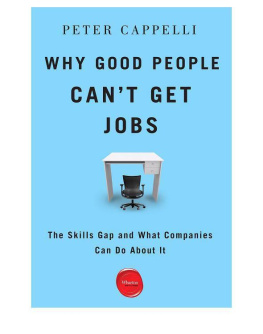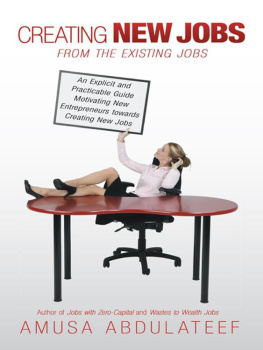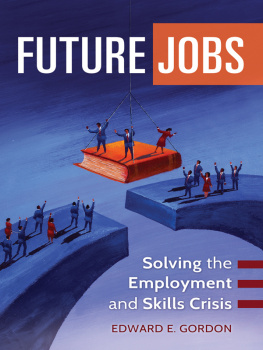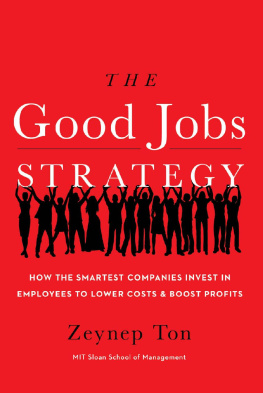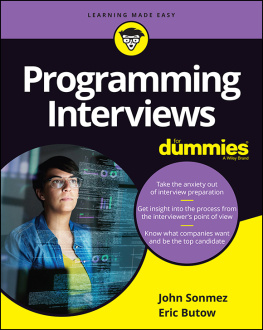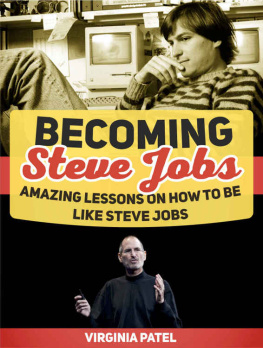
Why Good People Cant Get Jobs
The Skills Gap and What Companies Can Do About It
Peter Cappelli
Wharton Digital Press
Philadelphia
To Michael and Bo
Contents
Preface
Introduction
Chapter 1: Why Arent the Vacancies Being Filled?
Chapter 2: The Skills Gap Debate: Deconstructing Demand
Chapter 3: Workforce Facts and Myths: Parsing Supply
Chapter 4: Something Is Wrong with the Hiring Process
Chapter 5: A Training Gap, Not a Skills Gap
Chapter 6: The Way Forward
About the Author
Notes
Preface
Many of the important ideas that now dominate the discussion of workplace issues emanated from employer organizations and consulting firms. Often these organizations identify important new trends, and often they make sweeping pronouncements about issues that are thought to be very much still in debate in the academic world. This book grew out of a series of columns I wrote for Human Resource Executive magazine in response to various stories in the press about skill shortages. The editors at the Wall Street Journal then asked me to write an extended story exploring the evidence for the claim that employers simply could not find candidates with the skills to do the jobs they needed to fill. That article led to a follow-up story, and that, in turn, led my colleague Steve Kobrin to suggest this book. I corresponded with hundreds of people who commented on the Wall Street Journal article, and many of their stories appear here.
Thanks to Steve and to Shannon Berning at Wharton Digital Press and to John Wright for their help with this project; to Stacia Edwards and Arne Kalleberg for reading the manuscript; and to Jason Dickhaut for help chasing down the references. Thanks also to the World Economic Forum annual meeting in Davos for hosting a session on this topic.
And heres to the current generation of job seekers, and to the employers who need to hire them. May the two groups work out arrangements that better serve both their interests.
Peter Cappelli
Philadelphia
Introduction
In October 2011, I wrote an article entitled Why Companies Arent Getting the Employees They Need for the Wall Street Journal s annual Report on Leadership. In it, I noted that even in a time of dangerously high unemployment, companies complain that they cant find skilled workers and sometimes need months of hunting to fill a single mid-level job. I repeated the litany of complaints commonplace in recruiting circles: schools arent giving kids the right kind of training; the government isnt letting in enough highly skilled immigrants; even when the match is right, prospective employees wont accept jobs at the good wages offered. The list goes on and on. No doubt about it: finding good candidates who will work at a wage that still allows a company to make money is really hard to do.
In my article, I explained the conventional wisdom about what has become known as the skills gap. I also challenged that notionbecause when we look at the facts, there is no evidence to support it. The real culprits, I wrote, are the employers themselves. With an abundance of workers to choose from, employers are demanding more of job candidates than ever before. They want prospective workers to be able to fill a role right away, without any training or ramp-up time. To get a job, you have to have that job already. Its a Catch-22 situation for workersand its hurting companies and the economy.
My article drew more than 500 responses. Clearly, I had struck a nerve, and not only in readers struggling to get a job themselves. A remarkable number of those who wrote to me were in hiring positions, including recruiters. They reported that their organizations had shortages of employees because the companies had unrealistic standards and would not train or invest in candidates who could otherwise do the jobs. My favorite e-mail came from somebody in a company that had 25,000 applicants for a standard engineering position of whom the staffing people said not one was qualified. Could that really be possible?
Several peopleall CEOswrote in to say that the problem with hiring is that the American education system is so bad. I have been following this topic since I worked on a US Department of Labor commission in the 1980s. On average, employers who are actually doing the hiring were not then, and are not now, complaining about the lack of academic skills among job applicants. It is mainly other things that they see as important, in particular the lack of work experience. One cannot get work experience in school, and that is where training comes in. Furthermore, almost none of the employers who wrote to me are looking for recent graduates. They want experienced workers.
A few employers reported that qualified candidates will not take the jobs at the wages companies offer them. At this point, it may be necessary to remind these employers how markets work. There is a difference between saying, We cant find anyone to hire, and saying, We cant or dont want to pay the wages needed to hire. Just as there is no shortage of diamonds even though they are expensiveyou can buy all you want at the market pricenot being able or willing to pay the market price for talent does not constitute a shortage.
Virtually all those who wrote to me, especially those close to the hiring process, said something new: that there were serious problems with employer practices. Beyond unrealistic expectations, many also complained about applicant-tracking software and other computerized systems that screen applications electronically. Employers are overwhelmed by applications, and there is no way they can go through them all manually. So they use these systems to help. The downside is that the screening criteria are imperfect. Typically the screening software looks for key words, and if an applicant doesnt include the right key words, out goes his application. One reader who wrote to me described how he had been told he was perfect for a given positionexcept for the fact that his previous job title didnt match that of the vacancy, which was a title unique to that particular company.
A Failure of Imagination
The workers-jobs disconnect now plaguing the American economy is rich with such anecdotes, many of them ridiculous on their face but debilitating in practice, both to job seekers and to employers. But the disconnect also has a statistical face. In this book, I drill deeper into existing jobs data, probe the problem more broadly, and map a way forward. I use both data and anecdotesand interviews with jobs professionalsto break through the rhetoric and explore where the true impediments lie.
Is there really a skills gap? To what extent is the hiring process being held hostage by unrealistic hiring expectations, low wages, and automated software that can crunch thousands of applications per second without perhaps truly understanding any of them? What could best bridge the gap between employer expectations and applicant realities, and critically, who should foot the bill for it? In the final chapter, I lay out a series of solutions that can help us break through what has become a crippling employer-employee standoff.
Part of my interest in the subject is professional and academic. As the George W. Taylor Professor of Management at the Wharton School and codirector of the National Center on the Educational Quality of the Workforce during the Bush and Clinton administrations, and through countless commissions, symposia, and studies, I have been tracking the paradoxical forces bearing down on the American workplace: on the one hand, employers who say they cant find the qualified workers they need; on the other, willing and qualified workers who often cant find work for love or money. Even as the economy haltingly recovers, that gap grows wider.
Next page
